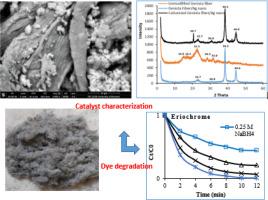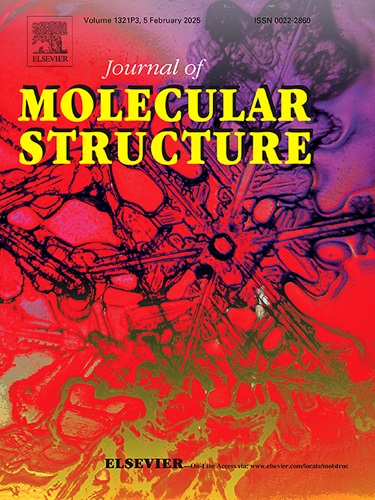新型纳米复合材料 Genista Scorpius 纤维/聚(二烯丙基二甲基氯化铵)/零价银的制备与表征:应用于催化还原水中的有害偶氮染料
IF 4
2区 化学
Q2 CHEMISTRY, PHYSICAL
引用次数: 0
摘要
生物质残渣是聚合纤维、化学品、生物燃料、纳米复合材料等的来源。它们多变的物理化学特性和化学功能化的能力为其在多个领域的应用提供了理由。在本研究中,Genista Scorpius 纤维被用作起始纤维素基质,并用聚(二烯丙基二甲基氯化铵)和零价银纳米粒子进行功能化。研究人员采用了多种分析方法,包括扫描电子显微镜、傅立叶变换红外光谱、X 射线衍射和 TGA/DTG 分析所研究样品的化学成分、形态特征、结晶度和热行为。扫描电镜分析表明,零价银纳米粒子广泛分散在 Genista 表面。在 2 thetas = 30.8°、38.5° 和 44.2°处观察到的 XRD 峰证实了功能化纤维表面存在零价纳米银颗粒。与原始纤维(17.37%)相比,功能化 Genista 纤维的残余质量最高(46.46%-50.04%)。纳米复合材料的热稳定性优于原始材料。研究人员进一步研究了纳米复合材料作为催化剂,使用硼氢化钠(NaBH4)作为还原剂,在水悬浮液中催化还原铬黑 T 和萘酚蓝黑 B 的情况。讨论了影响催化还原的几个实验条件,包括 NaBH4 浓度、初始染料浓度、反应时间和水浴温度。在以下最佳条件下,曙红和萘酚溶液完全脱色:时间 = 8 分钟,pH = 6,NaBH4 = 1 M,C0 = 40 mg/L,T = 50 °C。使用零阶、一阶和二阶反应动力学分析了偶氮染料溶液的催化降解。计算得出的胭脂红和萘酚溶液的活化能分别为 58.53 kj mol-1 和 57.47 kj mol-1。这些小数值证实了所制备的纳米复合材料在水净化中的使用效率。本文章由计算机程序翻译,如有差异,请以英文原文为准。

Preparation and characterization of a new nanocomposite, Genista Scorpius fibers/Poly (diallyldimethylammonium chloride)/zero valent silver: Application to the catalytic reduction of hazardous azo dyes in water
Biomass residues constitute a source of polymeric fibers, chemicals, biofuels, nanocomposites, etc. Their versatile physico-chemical characteristics and their aptitude to be chemically functionalized justify their employment in several domains. In the present study, Genista Scorpius fibers were used as a starting cellulosic substrate, functionalized with Poly (diallyldimethylammonium chloride), and zero valent silver nanoparticles. Several analytical methods including, SEM, FTIR, XRD, and TGA/DTG were used to analyze the chemical composition, morphological features, crystallinity, and thermal behavior of the studied samples. SEM analysis displayed the wide dispersion of the zero valent silver nanoparticles onto Genista surface. The XRD peaks observed at 2 thetas = 30.8°, 38.5°, and 44.2° confirmed the presence of zero valent silver nanoparticles onto the functionalized fibers surface. Highest residual masses were observed for the functionalized Genista fibers (46.46 %-50.04 %) compared to virgin fibers (17.37 %). The nanocomposites were more thermally stable than the virgin material. The nanocomposites were further investigated, as catalysts, for the catalytic reduction of Eriochrome Black T and Naphthol blue black B in aqueous suspension using sodium borohydride (NaBH4) as a reducing agent. Several experimental conditions influencing the catalytic reduction including NaBH4 concentration, initial dyes concentrations, time of reaction, and bath temperature were discussed. Eriochrome and Naphthol solutions were completely decolorized under the following optimum conditions: time = 8 min, pH = 6, NaBH4 =1 M, C0 = 40 mg/L, and T = 50 °C. The catalytic degradation of the azo dye solutions was analyzed using, zero-, first- and second-order reaction kinetics. The calculated activation energies were equal to 58.53 kj mol−1 and 57.47 kj mol−1 for Eriochrome and Naphthol solutions, respectively. These small values confirmed the efficiency of the use of the prepared nanocomposites in water purification.
求助全文
通过发布文献求助,成功后即可免费获取论文全文。
去求助
来源期刊

Journal of Molecular Structure
化学-物理化学
CiteScore
7.10
自引率
15.80%
发文量
2384
审稿时长
45 days
期刊介绍:
The Journal of Molecular Structure is dedicated to the publication of full-length articles and review papers, providing important new structural information on all types of chemical species including:
• Stable and unstable molecules in all types of environments (vapour, molecular beam, liquid, solution, liquid crystal, solid state, matrix-isolated, surface-absorbed etc.)
• Chemical intermediates
• Molecules in excited states
• Biological molecules
• Polymers.
The methods used may include any combination of spectroscopic and non-spectroscopic techniques, for example:
• Infrared spectroscopy (mid, far, near)
• Raman spectroscopy and non-linear Raman methods (CARS, etc.)
• Electronic absorption spectroscopy
• Optical rotatory dispersion and circular dichroism
• Fluorescence and phosphorescence techniques
• Electron spectroscopies (PES, XPS), EXAFS, etc.
• Microwave spectroscopy
• Electron diffraction
• NMR and ESR spectroscopies
• Mössbauer spectroscopy
• X-ray crystallography
• Charge Density Analyses
• Computational Studies (supplementing experimental methods)
We encourage publications combining theoretical and experimental approaches. The structural insights gained by the studies should be correlated with the properties, activity and/ or reactivity of the molecule under investigation and the relevance of this molecule and its implications should be discussed.
 求助内容:
求助内容: 应助结果提醒方式:
应助结果提醒方式:


